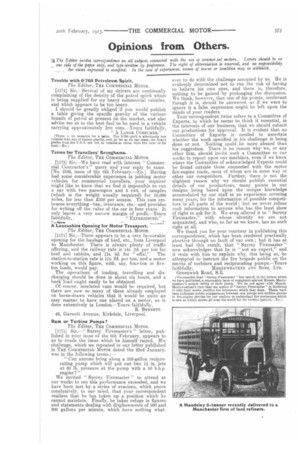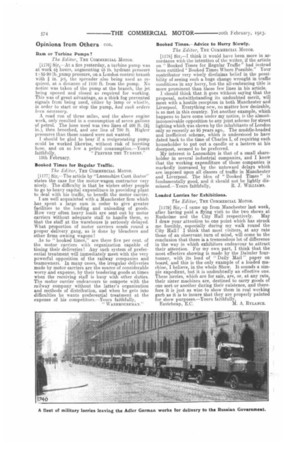Opinions from Others.
Page 29

Page 30

If you've noticed an error in this article please click here to report it so we can fix it.
a The Editor invites correslandence On all subjects connected with the use of commer.ial motors. Letters shouid he on
one side of the paper only, and type-written by preference. The right of abbreviation is reserved, and no responsibility , for views expressed is accepted. In the case of experiences, names of towns or localities may be withheld.
Trouble with 4'760 Petroleum Spirit,
The Editor, THE COMMERCIAL MOTOR.
[1172] Sir,—Several of my drivers are continually complaining of the density of the petrol spirit which is being supplied for my heavy commercial vehicles, and which appears to be too heavy. I should be greatly obliged if you would publish a table giving the specific gravity of the various brands of petrol at present on the market, and also advise me as to the best fuel to be used in a vehicle carrying approximately five tons.—Yours faithfully,
[There is no occasion for a table. The 0.750,pirit is admittedly less volatile than any of lighter gravity, and, so far as we can learn, the heavy grades from. the U.S.A. are not so volatile Si those from the near or far East.—En.j
Terms for Travellers' Broughams.
The Editor, THE COMMERCIAL MOTOR.
[1173] Sir,—We have read with interest " Commercial Contractor's" query and your reply to same. fNo. 2106, issue of the 6th February.—ED. Having had some considerable experience in jobbing motor vehicles for commercial travellers, your inquirer might like to know that we find it impossible to run a car with two passengers and 5 cwt. of samples (which is the weight usually required) for 10,000 miles, for less than ,2350 per annum. This sum embraces everything—tax, insurance, etc.—and provides for writing off the value of the car in four years. It only leaves a very narrow margin of profit.—Yours
faithfully,. "EXPERIENCED."
A Lancashire Opening for Motor Transport.
The Editor, THE COMMERCIAL MOTOR.
[1174] Sir,—There appears to be a very favourable opening for the haulage of beef, etc., from Liverpool to Manchester. There is always plenty of traffic offering, and the railway rate is 14s. 2d. per ton for beef and rabbits, and us. ad. for " offal." The station-to-station rate is lls. 8d. per ton, and a motor working on this figure, with, say, four-ton or fiveton leads, would pay. The operations of loading, travelling and discharging should be done in about six hours, and a back load ought easily to be obtained. Of course, insulated vans would be required, but there are now so many of these already employed on horse-drawn vehicles that it would be quite an easy matter to have one placed on a motor, as is done extensively in London.—Yours faithfully, R. BENNETT. 42, Garnett Avenue, Kirkdaie, Liverpool.
Ram or Turbine Pumps ?
The Editor, THE COMMERCIAL MOTOR.
[1173] Sir,—" Surrey Firemaster's " letter, published in your issue of the 6th February, appears to us to evade the issue which he himself raised. His challenge, which we repeated in our letter published in THE COMMERCIAL MOTOR dated the 23rd January, was in the following terms:— . " Can anyone bring along a 350-gallon reciprocating _pump which will put out two 1+ in. jets at 60 lb. pressure at the pump with a 50 b.h.p. engine?" We invited " Surrey Firemaster " to attend at our works to see this performance exceeded, and we have been met by a series of evasions, which prove conclusively, to our mind, that your correspondent realizes that he has taken up a position which he cannot maintain. Finally, he takes refuge in figures and statements dealing with displacements of 500 and 600 gallons per minute, which have nothing what ever to do with the challenge acoepted by us. He is evidently determined not to run the risk of having to believe his own eyes, and there is, therefore, nothing to be gained by prolonging the discussion. We think, however, that one of his points, irrelevant though it is, should be answered, as if we were to ignore it a false impression might be left upon the minds of your readers. Your correspondent twice refers to a Committee of Experts, to which he seems to think it essential, in the interests of our business, that we should submit our productions for approval. It is evident that no Committee of Experts is needed to ascertain whether the work specified in his challenge is being done or not. Nothing could be more absurd than his suggestion. There is no reason why we, or any other firm, should invite such a Committee to our works to report. upon our machines, even if we know where the Committee of acknowledged Experts could. be found outside those connected with the motor fire-engine trade, most. of whom are in souse way or other our competitors. Further, there is not the slightest reason why we should publish essential details of our productions, many points in our designs being based upon the unique knowledge accumulated by our staff in an experience covering ninny years, for the information of possible competitors in all parts of the world ; but we never refuse such information to anyone who has the least show of right to ask for it. We even offered it to " Surrey Firemaster," with whose identity we are not acquainted, and who, so far as we know, has no such
right at all. We thank you for your courtesy in publishing this correspondence, which has been rendered practically abortive through no fault of our own; but it has at least had this result, that " Surrey Firemaster" now acknowledges that he is "not an expert," and it rests with him to explain why, this being so, he attempted to instruct the fire brigade public on the merits of turbines and reciprocating pumps.—Yours faithfully, MERRYWEATHER AND SONS, LTD. Greenwich Road, S.E.
We consider that '• Surrey Firemaster "has raised, in the letters which we have published, a reasonable basis of complaint against Messrs. Merry. weather's output rating of their pump. We do not agree with Messrs. Merryweather's view that the action of' Surrey Firemaster " in declining o visit their works justifies the inferences which they draw. There have been sufficient public comparisons between ram pumps and turbine pumps 'n flre.enginc service for our readers to understand the preference which 's now so widely shown all over the world for the tot-bine rattern.—Eo.]
Ram or Turbine Pumps ?
The Editor, THE COMMERCIAL MOTOR.
[1176] Sir,—At a fire yesterday, a turbine pump was at work 4i hours, augmenting 45 lb. hydrant pressure ti 85-90 lb._pump pressure, on a London control branch
with in. jet, the spreader also being used as required, at a distance of 1100 ft. from the pump. No notice was taken of the pump at the branch, the jet being opened and closed as required for working. This was of great advantage, as a thick fog prevented signals from being used, either by lamp or whistle, in order to start or stop the pump, had such orders been necessary.
A road run of three miles, and the above engine work, only resulted in a consumption of seven gallons of petrol. The hose used was two lines of 400 ft. (2i in.), then breeched, and one line of 700 ft. Higher pressures than those named were not wanted.
I should be glad to hear if a reciprocating pump could be worked likewise, without risk of bursting hose, and on 50 low a petrol consumption.—Yours faithfully, PREFERS THE TURBINE." 15th February.
Booked Times for Regular Traffic.
The Editor, THE COMMERCIAL MOTOR, [1177] Sir,—The article by "Lancashire Cont ibutor" states the case for the motor-wagon contractor very nicely. The difficulty is that he wishes other people to go to heavy capital expenditure in providing plant to deal with his traffic, to benefit the motor carrier.
I am well acquainted with a Manchester firm which has spent a large sum in order to give greater facilities to the loading and unloading of goods. How very often heavy loads are sent out by motor carriers without adequate staff to handle them, so that the staff at the warehouse is seriously delayed. What proportion of motor carriers sends round a proper delivery gang, as is done by bleachers and other firms owning wagons?
As to "booked times," are there five per cent, of the motor carriers with organization capable of timing their deliveries? Any such system of preferential treatment will immediately meet with the very powerful opposition of the railway companies and teamowners, In many cases, the irregular deliveries made by motor carriers are the source of considerable worry and expense, by their tendering goods at times when the receiving staff is busy with other duties. The motor carrier endeavours to compete with the railway company without the latter's organization and methods of distribution, and when he gets into difficulties he wants preferential treatment at the expense of his competitors.—Yours faithfully,
" WAREHOUSEMAN.'" Booked Times.advice to Hurry Slowly.
The Editor, THE COMMERCIAL MOTOR.
[1178] Sir,—I think it would have been more in accordance with the intention of the writer, if the article on "Booked Times for Regular Traffic" had instead been entitled "Booked Times Where Possible." Your contributor very wisely disclaims belief in the possibility of seeing such a huge change wrought in traffic conditions in any hurry, but the all-embracing title is more prominent than those few lines in his article. I should think that it goes without saying that the proposal, notwithstanding its undoubted merit, will meet with a, hostile reception in both Manchester and Liverpool. Everything new, no matter how desirable, is so met in this country. Yet another example, which happens to have come under my notice, is the almostinconceivable opposition to any joint scheme for street lighting which was shown by the inhabitants of London only so recently as 95 years ago.. The muddle-headed and inefficient scheme, which is understood to have dated back to the time of Charles I, of requiring each householder to put out a candle or a lantern at his doorpost, seemed to be preferred.
My interest in Lancashire is that of a small shareholder in several industrial companies, and I know that the working expenditure of those companies is markedly increased by the untoward delays which are imposed upon all classes of traffic in Manchester and Liverpool. The idea of "Booked Times" is fundamentally good, and it should not be lightly dis missed.—Yours faithfully, R. 3. WILLIAMS.
Loaded Lorries for Exhibitions.
The Editor, THE COMMERCIAL MOTOR.
[1179] Sir,—I came up from Manchester last week, after having paid a flying visit to the two shows at
Rusholme and the City Hall respectively. May I draw your attention to one point which has struck me forcibly, especially during my walk round the City Hall ? I think that most visitors, at any rate those of an observant turn of mind, will come to the conclusion that there is a tremendous lot of difference in the way in which exhibitors endeavour to attract their attention. For my own part, I think that the most effective showing is made by the Daimler fourtonner, with its load of "Daily Mail" paper on board, and this is the only example of a loaded machine, I believe, in the whole Show. It sounds a simple expedient, but it is undoubtedly an effective one. These -lorries, which are for sale, are, or, at any rate, their sister machines are, destined to carry goods of one sort or another during their existence, and therefore it is just as wise to show them in real working garb as it is to insure that they are properly painted for show purposes.—Yours faithfully,
Eastcheap, E.C. M. A. RYLANCE.
































